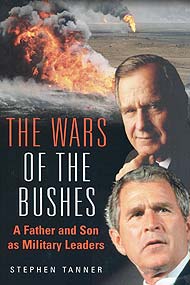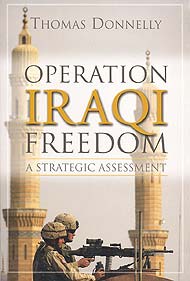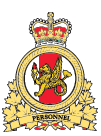 This information has been archived for reference or research purposes.
This information has been archived for reference or research purposes.
Archived Content
Information identified as archived on the Web is for reference, research or recordkeeping purposes. It has not been altered or updated after the date of archiving. Web pages that are archived on the Web are not subject to the Government of Canada Web Standards. As per the Communications Policy of the Government of Canada, you can request alternate formats on the "Contact Us" page.
Book Reviews
The Wars of the Bushes
by Stephen Tanner,
Philadelphia: Casemate, 2004
Operation Iraqi Freedom A Strategic Assessment
by Thomas Donnelly,
Washington: AEI Press, 2004
Reviewed by Lieutenant-Colonel Michael Goodspeed
For more information on accessing this file, please visit our help page.

“The Wars of the Bushes” and “Operation Iraqi Freedom” are two recent publications that are worth reading for the starkly differing views they provide on the war in Iraq. Although both books have evident political biases, they are useful in gaining a sense of perspective on the most important conflict of the post-modern era.
Both books view the Iraqi campaign from a political and a strategic perspective, but these volumes offer a good deal more than that for they define the limits of the strategic debate on Iraq. Neither provides much in terms of what the available intelligence picture was like before the war, nor do they present a great deal of information in terms of understanding how the Iraqi campaign is currently being fought. And, given their timely nature, both books show evidence of being written in haste. Despite these issues, which are far from fatal criticisms, both books should be read as a kind of news genre and not as definitive examinations of the subject. In a world of sound bytes and shrink-wrapped opinion pieces, such a genre has its place on the reading list of the thoughtful officer. These slender books are very much a ‘snap shot in time’ viewed from two diametrically opposed angles. If regarded as such, they have value.
 “The Wars of the Bushes” is a brief, highly readable examination of the First and Second Gulf Wars. It was written by the American historian Stephen Tanner and provides an overview of American policy towards Iraq from the early 1990s until 2004. Tanner’s assessment of the last 15 years is, in a unique way, non-partisan, but it is by no means neutral.
“The Wars of the Bushes” is a brief, highly readable examination of the First and Second Gulf Wars. It was written by the American historian Stephen Tanner and provides an overview of American policy towards Iraq from the early 1990s until 2004. Tanner’s assessment of the last 15 years is, in a unique way, non-partisan, but it is by no means neutral.
The essential premise of “The Wars of the Bushes” is that George H.W. Bush was an incomparably better wartime president and strategist than George W. Bush. Tanner is candid in his assessment. The first Bush he sees as a gifted and capable leader, a talented tactician, a gifted diplomat and a masterful strategist. George H.W. Bush’s tenure in Washington is depicted as being possibly “the most surehanded military leadership” in American history. Tanner’s book assesses the development of the First Gulf War as “a near-perfect campaign, one in which foreign policy, a brilliantly recast American military, and a superb team at the White House engineered a magnificent victory at very little cost.” He sees ‘George Senior’s’ triumphs in the Middle East as his paradoxical undoing – Americans released from their external worries were freed to concentrate on internal matters.
George W. Bush he views in rather less flattering terms. The younger Bush he describes as a frightening gunslinger who has left America isolated and pursuing a reckless and incoherent foreign policy in the world’s most dangerous flashpoint. While it is difficult to find fault with Tanner’s view of Bush the Elder’s strategic abilities, his assessment of Bush the Younger is harsh and disparaging. Time will prove one way or another as to whether Tanner’s assessment is correct – and it is beyond the remit of this journal to forward judgments on allied politicians. Nonetheless, Tanner’s book is an instructive read for the military officer for a number of other reasons. He provides a useful overview of American military policy in two post-modern wars, and he provides a representative critical synopsis of American strategy in dealing with terrorism in the Islamic world. Tanner also gives us much food for thought on the efficacy and the implementation of the new post 9/11 doctrine of pre-emptive war. For these reasons alone, this book is worthwhile reading for Canadian officers. Whether or not one agrees with Tanner’s position, there is value in Canadians looking at both sides of these issues. There is unquestionably a degree of ambiguity and complexity about the Iraq war that soldiers, politicians and private citizens cannot ignore. Studying all dimensions of this phase of what is likely to be a long and involved conflict is a useful exercise. Tanner’s criticisms of George W. Bush’s war in Iraq are terse and pointed, but his criticisms are a more tempered variety than the strident brand of foreign policy assessment popularized by Michael Moore and kindred members of the anti-war movement. Canadian Forces officers should understand the nuances of this conflict and Tanner’s assessment is potentially one aspect of that understanding. Even though Tanner shows an unconcealed bias, his assessment is a worthwhile examination of a problem that will be with us for some time to come.
Tanner’s book has incidental qualities that recommend it as well. He provides useful insights into some of the key players and the political milieu that has been influential in shaping the events of these wars: Cheney, Rumsfeld, Powell, Clinton, Clark and of course, the two Bushes are all painted in fascinating vignettes, each of which underscores the need to understand the force of individual characters in shaping global events.
“Operation Iraqi Freedom”, written by Thomas Donnelly is, on the other hand, a useful contrast to Tanner’s book. Donnelly has a background both as a journalist and as a staffer on the House Armed Services Committee. He is also a resident fellow of the American Enterprise Institute. “Operation Iraqi Freedom” is worth reading for several reasons, not the least of which is that it provides balance and contrast to Tanner’s trenchant views on the war. Donnelly believes that the invasion of Iraq and the creation of a democratic beachhead in the Middle East was a strategic necessity. He also puts forward the interesting proposition that it was the Pentagon that misunderstood the true nature of the conflict as it organized the US military to fight the war rapidly rather than thoroughly crushing all armed resistance. Donnelly takes a much more benign view of George W. Bush than does Tanner, and the early and latter chapters of his book are liberally sprinkled with quotations from President Bush’s speeches. Donnelly is careful not to be perceived as an apologist or an advocate for Bush, but he provides context and structure for his descriptions of how the subsequent campaign unfolded. He spends little time assessing the issue of weapons of mass destruction or the al Qaeda link and, instead, focuses on the nature of Saddam Hussein’s rule and the need to rebuild a prosperous and democratic Iraq.
Donnelly spends considerable effort in describing the build-up to war and the conduct of the actual invasion. Although his descriptions of the actual campaign are concise and authentic, they do not provide the reader with much detail or any real feel for the pace and nature of the battle. Donnelly’s views (and Tanner’s) on the counter-insurgency campaign that followed the conventional victory are again ‘light’ on descriptions of the actual operations or any assessments as to how the war should be fought. Instead, he concentrates, for the most part, on the political aspects of a prolonged war in Iraq. Donnelly is a proponent of the school of thought that advocates a further transformation and development of the American army to turn it into a force capable of defeating the insurgency in Iraq.
Both these authors focus on staking out their views on the strategic advisability of the war. Both volumes are short and have been written with a view to influencing a thoughtful readership as to the value of the war to both Americans and the rest of the world. In this respect, they will have a brief shelf life. That should not deter people from reading these works. There is value in this kind of extended essay. At the time of writing, it is too early to predict how the war will play out, but the conflict is certainly a long way from its final conclusions and war is not a predictable endeavour. Accordingly, we would do well to give both these interpretations of the war some serious thought.
![]()
Michael Goodspeed is an infantry officer employed in staff duties at the Canadian Defence Academy.






